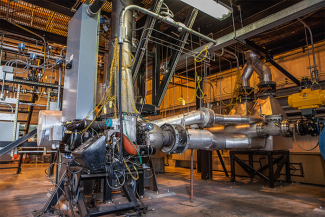Increasing demands for power coupled with environmental concerns are driving the development of more efficient energy conversion technologies that can produce more energy from cheap and abundant fossil fuels while reducing carbon dioxide (CO2) emissions. Building upon a history of success and a tradition of innovation, NETL’s energy conversion engineering research has produced several transformational technologies that can burn fossil fuels at very high efficiencies to generate electricity, and capture CO2 emissions.
Chemical Looping Combustion (CLC) is one of these transformational technologies and describes a process in which fossil fuels are combusted in nearly pure oxygen, rather than air. During CLC, a solid material, an “oxygen carrier”—usually a solid, metal based compound—supplies the oxygen needed to burn fuel in a fuel reactor. The oxygen carrier (now depleted of oxygen) then travels to the air reactor, where contact with air renews its oxygen content. The carrier can then return to the fuel reactor and start the process over again. This unique approach to fossil fuel combustion presents an opportunity to simplify CO2capture in power plant applications because the exhaust gases from this process consist of only CO2 and water vapor.
Condensing the water and isolating the CO2 is straightforward, unlike removing CO2 from the gas mixtures that conventional coal-fired plants emit. With other carbon capture concepts, it takes more parasitic energy to run the process. The benefit of CLC is that those problems are avoided by using an oxygen carrier to transfer the oxygen to the fuel reactor. CLC will also work in natural-gas-fired plants, which (like coal-fired plants) produce CO2, further expanding options for future commercialization. In fact, CLC can eliminate large capital and operating investments and other energy costs associated with oxygen generation and thus has the potential to meet cost and performance goals for commercial applications. NETL has been testing carriers in its own pilot-scale 50 KWth (kilowatt-thermal) chemical looping combustion reactor.
Direct Power Extraction (DPE) research is also expanding NETL’s energy conversion engineering competency. NETL’s DPE research is focused on developing technologies for oxy-fuel combustion using magnetohydrodynamics (MHD) to directly extract power from fossil energy combustion products. MHD describes the forces and properties of electrically conductive fluids, such as plasmas, in a magnetic field. The process, which has no moving parts, can be more efficient in power production because it operates at temperatures that are only possible by using oxy-fuels. High-temperature oxy-fuel combustion products accelerate through a magnetic field to produce electric current, essentially creating an electromagnetic turbine expander. Hot exhaust from the expander can be used in conventional steam boilers, potentially enabling a high-efficiency retrofit to existing powerplants.
In contrast to earlier attempts to harness MHD physics for power generation, recent scientific advances in low-temperature plasma generation, material science, and numeric models suggest that the concept can achieve high-efficiency power generation with inherent control of carbon dioxide. At NETL, work is underway to develop durable electrodes, extend plasma conductivity, and optimize the process performance with validated numeric models.
Pressure Gain Combustion (PGC) can improve the efficiency of turbine generators by increasing the pressure using a transient, rather than steady, combustion process. While conventional gas turbine engines undergo a pressure loss during steady combustion, PGC uses constant volume combustion to create a pressure rise across the combustor, while consuming the same amount of fuel as the conventional, steady combustion. NETL researchers are working on technical challenges including fuel injection, fuel and air mixing, backflow prevention, wave directionality, controlling emissions of nitrogen oxide and carbon monoxide, unsteady heat transfer, and cooling flow challenges. The goal of the work is to develop PGC systems for integration with combustion gas turbines. PGC research at NETL may lead to combined cycle power plants with higher efficiencies and reduced emissions for greater energy security, environmental improvements, and economy.
These are just a few of the ways that NETL is innovating energy conversion engineering to make better use of our valuable fossil fuel energy sources and ensure that we are protecting the environment for future generations.




